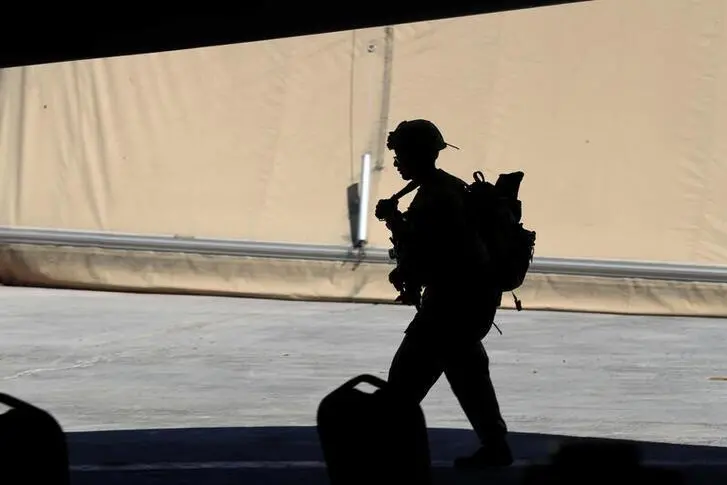PHOTO
Eighteen years ago on Friday, then-President George W. Bush announced that US forces had begun a military operation in Iraq, vowing to destroy Iraqi weapons of mass destruction and end the rule of Saddam Hussein. In the years since, more than 4,700 American and allied troops have been killed, along with more than 100,000 Iraqi civilians.
On Monday, seven rockets targeted an Iraqi air base housing US troops north of Baghdad — the latest in a string of attacks that Washington routinely blames on Iran-linked factions. There have been many attacks on American personnel since President Joe Biden took office in January, including a Feb. 15 attack on the northern Iraqi city of Irbil, which killed a civilian contractor with the US-led military coalition and wounded six others, including a US service member.
NATO Secretary-General Jens Stoltenberg last month said that the military alliance would expand its security training mission in Iraq. NATO’s decision to expand its footprint in Iraq came on the heels of the deadly rocket attack in Irbil.
Iran has a long record of proxies attacking its rivals in order to create a degree of plausible deniability. Tehran has thus denied any role in any of the latest attacks. Iranian Ambassador Majid Takht-Ravanchi told the UN that claims it was involved were “completely baseless and lacking legal credibility.”
In response to the recent attacks, Biden ordered an airstrike on facilities in eastern Syria, near the border with Iraq, which the US claimed were used by Iran-backed militias. According to a report last week, these Tehran-backed Iraqi paramilitaries agreed to stop attacks against US forces in Iraq on the condition that Iraqi Prime Minister Mustafa Al-Kadhimi formally demands an American withdrawal.
The 2003 invasion of Iraq was the most controversial regional incident of recent times. With much of its state apparatus having been destroyed in the past two decades, Iraq is going through a period of instability and foreign intervention. The recent US military drawdown in Iraq is reshaping political dynamics not only in Baghdad, but also in the broader Middle East. The vacuum created by this withdrawal is expected to be filled by several actors. The intervention of these actors adds a new burden to Iraq and the Iraqi people, while weakening the current government’s efforts to gradually restore the country’s role and status.
The Middle East order that had been in place since the US invasion of Iraq in 2003 evolved further following the Arab uprisings that swept the region at the beginning of the last decade. With these uprisings, Iraq has once again emerged as a regional spot where diverse interests both align and conflict. The country has been caught between several external actors — such as Iran, Turkey and the US — that are perceived as seeking regional hegemony. Each of these countries has its allies in Iraq.
Both Iran and the US continue to control state policy, with each side having established some proxy institutions within the Iraqi state, which is now divided between the Iranian and the American spheres of influence. While Washington is influential in the official structure, Tehran has intervened through unofficial institutions.
Iran and Turkey both share borders with Iraq and they are rapidly becoming the most influential external actors in the country. Tehran views Iraq as a focal point through which to shuffle relations in the region and the security architecture of the Gulf. Iran’s expansionist Iraqi policy has, since 2003, caused alarm in the US, the Arab world and, to some extent, Turkey.
Ankara also intervenes in Iraq. It carries out military operations against Kurdish militants in the north. From the Turkish perspective, the American intervention in Iraq and its aftermath worsened Turkey’s security problem. An important aspect of Turkey’s security approach is ingraining the NATO mission in Iraq with an anti-Kurdistan Workers’ Party (PKK) theme. As the number of NATO personnel in Iraq increases, Turkey will likely expand its presence in the mission.
Then there are the European actors, which aim to reduce Iraq’s dependence on the US and Iran. However, further foreign meddling in Iraq may worsen the country’s economic, security and political situation, which will have a negative impact on European interests in areas such as counterterrorism and migration. A number of European countries also have military deployments in Iraq as part of the anti-Daesh coalition and are concerned about the protection of their forces.
Thus, the US invasion of Iraq did not solve a regional problem, but rather created a larger ground for foreign intervention, further destabilizing the country and the region for the next two decades.
• Sinem Cengiz is a Turkish political analyst who specializes in Turkey's relations with the Middle East. Twitter: @SinemCngz
Copyright: Arab News © 2021 All rights reserved. Provided by SyndiGate Media Inc. (Syndigate.info).





















